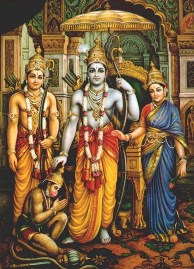Yuddha Kanda, Chapter 106
Rama speaks to Gods' Charioteer Matali
Thrilling with rapture, that charioteer, the charioteer of Ravana, drove forward quickly, his chariot, a chariot, which was capable of attacking the army of enemies, a wonderful piece of art like Gandharva-city, an imaginary city in the sky, mounted with flags, yoked with horses of excellent quality adorned with golden necklaces, filled with war-implements, adorned with rows of flags and banners, which was devouring the sky as it were, making the earth resound, which was the destroyer of the army of adversaries and caused delight to its own.
Rama saw that Ravana's chariot, which was coming speedily with a noise, bearing a large flag-staff, yoked with black horses, endowed with a terrific luster, blazing like an aerial car in the sky, with a luster of the sun, filled with lightning-like flags and with a beautiful appearance of a rain-bow.
Seeing that chariot, releasing streams of arrows, like a cloud releasing streams of rain, with a noise equal to that of a bursting mountain, struck with a diamond, Rama after stretching his bow in a crescent shape, spoke to Matali, Indra's charioteer as follows:
"O Matali! From the way in which the enemy is marching forward from left to right with a great speed in his chariot more, it appears that heart has been set by him upon destroying himself in the battle."
"Therefore, take care and march forward, facing the chariot of the enemy I wish to destroy it, even as the wind would blow a cloud."
"Without fear and flurry and with a steady heart and vision, and the movement of the reins fully controlled, drive the chariot swiftly."
"You need not be instructed by me, accustomed as you are to drive the chariot of Indra the lord of celestials. Keen as I am to fight with a close attention, I am just reminding you and not teaching you."
Extremely gratified with those words of Rama, that Matali the excellent charioteer of gods drove on the chariot.
Passing the huge chariot of Ravana on the right, the charioteer then set Ravana shaking, by the dust risen from the wheels of his own chariot.
The enraged Ravana then, with his coppery eyes wide open, trembled Rama, who stood facing his chariot, with arrows.
Meeting fortitude with anger, though provoked with assault, Rama took hold of Indra's bow, which was possessed of extra ordinary impulse in the battle-field.
He also seized hold of arrows of exceeding swiftness, which were shining like sun-beams. Then began that great battle between the two warriors (Rama and Ravana) who were desirous of killing each other, while facing each other like two proud lions.
Then, the gods along with the Gandharvas the celestial musicians, Siddhas the demigods and great sages, desirous of Ravana's ruin, arrived to see the battle of both the chariot-warrriors.
Thereupon, terrific portents that caused one's hair to stand on end, appeared giving an augury of doom to Ravana and prosperity to Rama.
The god of rains poured blood on Ravana's chariot. Horrible winds blew from right to left, forming circles.
A large flock of vultures, roaming about in the sky, was flying forward in the same direction in which Ravana's chariot was going.
Lanka was overcast with dusk, resembling a (red) Japa flower. The land in Lanka, as also the day appeared as if they were blazing.
Large meteors, along with lightnings fell with great noise. Those entities, inimical to Ravana, made demons to lament.
The earth on which Ravana was there, trembled. The arms of fighting demons looked as if they were clasped.
Fallen before Ravana, the rays of the sun appeared coppery, yellow, white and dark, like mineral ores on a mountain.
The she-jackals followed by vultures hastily uttered inauspicious howls, on beholding Ravana's face as also vomiting fire from their mouths.
Scattering the dust upwards over the battle-field and clouding the vision of that Ravana, the wind blew in a direction inimicable to him.
Even without the appearance of clouds, thunderbolts fell on his army on all sides, with a noise which was hard to endure.
All the quarters and intermediate points of the compass became covered with darkness and due to outpourings of dust, the sky became difficult to be seen.
Hundreds of dreadful Sarika* birds, with their awful howls, terribly fighting there, fell down upon Ravana's chariot.
His horses discharged sparks of fire from their hips and loins as also tears from their eyes, releasing out fire and water at the same time continuously.
Frightful portents in multitude thus sprang up, bringing danger and destruction to Ravana.
Pleasant and auspicious omens, depicting victory of Rama appeared on all sides, before Rama.
Seeing the pleasant omens depicting his victory, Rama was very much pleased and considered Ravana as (already) dead.
Then Rama, with the knowledge of all omens, having seen those portents in his own way in the battle-field, obtained rejoice as well as extreme happiness and shown enhanced prowess in combat.

